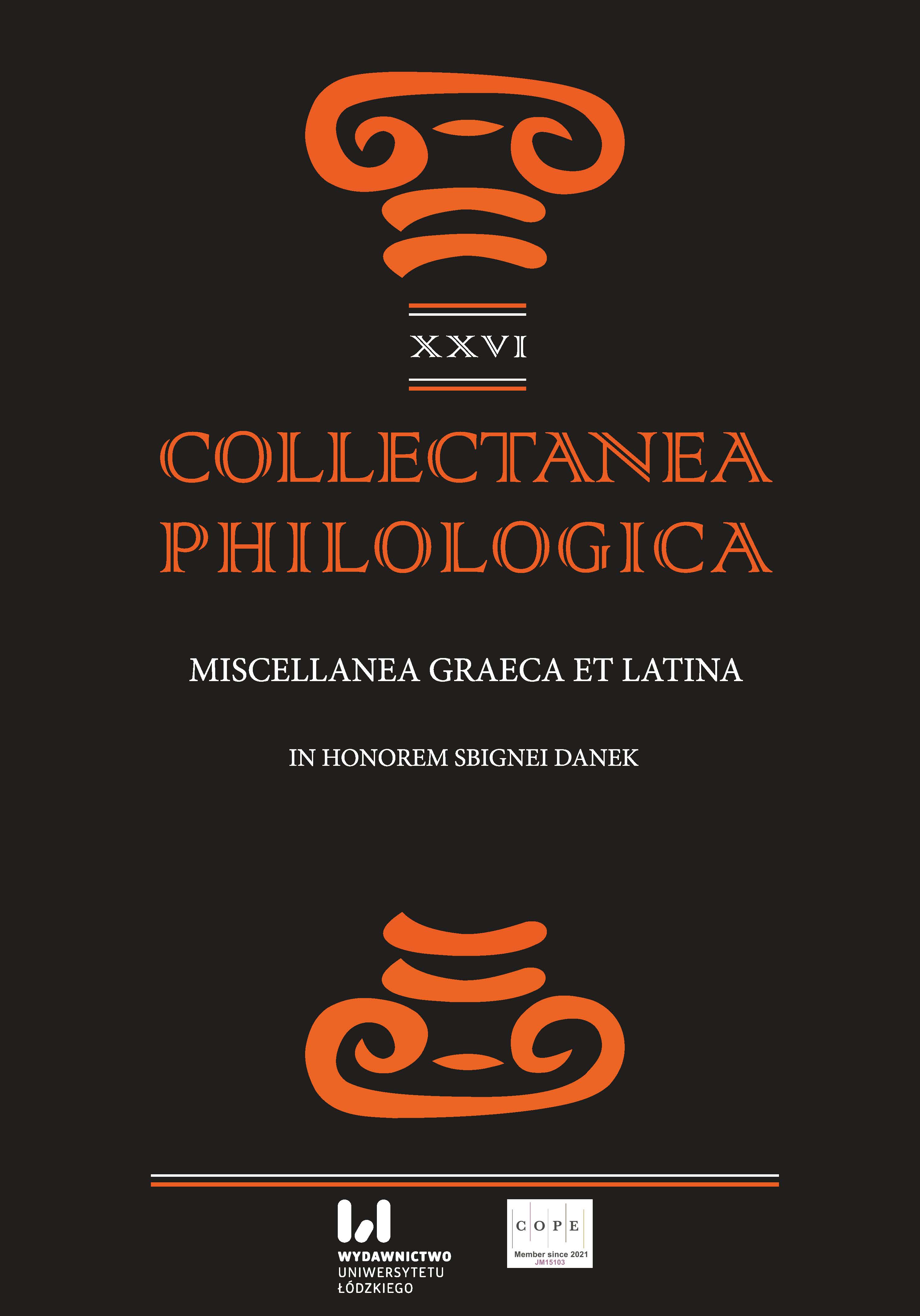Nowożytne próby rehabilitacji żony Sokratesa u Christopha Martina Wielanda, Eduarda Zellera oraz w Obronie Ksantypy Stefana Pawlickiego i Obronie Ksantypy Ludwika Hieronima Morstina
DOI:
https://doi.org/10.18778/1733-0319.26.19Słowa kluczowe:
Ksantypa, żona, obrona, Sokrates, mąż, Wieland, Zeller, Pawlicki, MorstinAbstrakt
The aim of the article is to explain how views on Xanthippe as a wife and Socrates as a husband were verified in modern times, i.e., how the defence of a woman considered the most unbearable in ancient Greece looked like. Four texts served as the most representative examples: Ch.M. Wieland’s short essay on Xanthippe, E. Zeller’s essay entitled Zur Ehrenrettung der Xanthippe and S. Pawlicki’s the fictitious defence speech of Ksantypa (titled The Apology Xanthippe), and L.H. Morstin’s comedy The Apology Xanthippe. It should be emphasized that the above-mentioned writers and researchers of antiquity were clearly influenced by their predecessor.
Bibliografia
Breitenbach, H.R. (1966). Xenophon von Athen. Stuttgart: Alfred Druckenmüller Verlag.
Google Scholar
Grimm, J., Grimm, W. (1854–1961). Deutsches Wörterbuch. http://www.woerterbuchnetz.de/DWB/männin [04.01.2023].
Google Scholar
Lönborg, S. (1949). “Socrates and Xanthippe”. Theoria XV. 198–204. https://doi.org//10.1111/j.1755-2567.1949.tb00150.x
Google Scholar
Marchewka, A. (2017). Kalokagathia kobiet u Ksenofonta. W: W. Gajewski; I. Milewski (red.). W kręgu antycznych politei. Księga ofiarowana Janowi Ilukowi. Gdańsk: Wydawnictwo Uniwersytetu Gdańskiego. 251–261.
Google Scholar
Marchewka, A. (2018). „Ksantypa – dobra żona Sokratesa”. Collectanea Philologica XXI. 75–86. https://doi.org/10.18778/1733-0319.21.05
Google Scholar
Morstin, L.H. (1957). Spotkania z ludźmi. Kraków: Wydawnictwo Literackie.
Google Scholar
Morstin, L.H. (1959). Tetralogia Antyczna. Penelopa. Obrona Ksantypy. Kleopatra. Panteja. Kraków: Wydawnictwo Literackie.
Google Scholar
Morstin, L.H. (1961). Moje przygody teatralne. Warszawa: Czytelnik.
Google Scholar
Mróz, T. (2016). „Stefana Pawlickiego obrona Ksantypy”. Zeszyty Historyczno-Teologiczne. Rocznik Zmartwychwstańców XXII 22. 123–138. https://www.academia.edu/35715985/ZESZYTY_HISTORYCZNO_TEOLOGICZNE_Rocznik_Zmartwychwsta%C5%84c%C3%B3w_22_2016_ [29.05.2023].
Google Scholar
Mylik, M. (2016). Życie i dorobek naukowy ks. Stefana Pawlickiego CR (1839–1916). W: ks. dr W. Mleczko (red.). Ks. Stefan Pawlicki CR: Człowiek nauki i wiary w służbie odnowy społecznej i duchowej. Kraków: Wydawnictwo św. Jana Pawła II. 11–47.
Google Scholar
Natanson, W. (1967). Morstin. Warszawa: Agencja Autorska.
Google Scholar
Pawlicki, S. (1868). „Obrona Xantippy”. Kronika Rodzinna I (10). 146–150. https://www.wbc.poznan.pl/dlibra/publication/56417/edition/72456/content [30.01.2023].
Google Scholar
Sandstede, I.-J. (1999). Die Göttinnen der Anmut in Wielands Werk. Ein Beitrag zu Rhetorik der Aufklärung. Diss. Carl von Ossietzky Universität Oldenburg. https://oops.uni-oldenburg.de/348/2/ sangoe00.pdf [27.05.2023].
Google Scholar
Sinko, T. (1932). Literatura grecka. Literatura klasyczna (w. V–IV przed Chr.). T. 1, cz. 2. Kraków: Polska Akademia Umiejętności.
Google Scholar
Teles. (1909). Teletis reliqiae. O. Hence (ed.). Tubingae: Libraria I.C.B. Mohrii.
Google Scholar
Wieland, Ch.M. (1858). Xantippe. In: Ch.M. Wieland. Sämmtliche Werke. Bd. 36. Leipzig: Verlag von Georg Joachim Göschen. 258–261.
Google Scholar
Wieland, Ch.M. (1912). Erläuterung. In: Xenophon. Schriften über Sokrates. Nach der Übersetzung von C.M. Wieland. München, Leipzig: Georg Müller. 56–59.
Google Scholar
Zeller, E. (1865). Vorträge und Abhandlungen Geschichtlichen Inhalts. Leipzig: Fues’s Verlag. Vorträge und Abhandlungen geschichtlichen Inhalts: Zeller, Eduard, 1814–1908. https://archive.org/details/vortrgeundabha00zell/page/n5/mode/2up [30.01.2023].
Google Scholar
Zieliński, T. (1958). „Ksantypa”. Listy Teatru Polskiego 11 (sezon 1957–1958). 11–17.
Google Scholar
Opublikowane
Wersje
- 2023-12-08 - (2)
- 2023-10-05 - (1)
Jak cytować
Numer
Dział
Licencja

Utwór dostępny jest na licencji Creative Commons Uznanie autorstwa – Użycie niekomercyjne – Bez utworów zależnych 4.0 Międzynarodowe.












